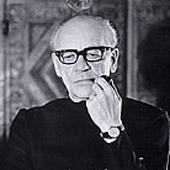
Rudolf Wagner-Régeny
Born in Romania, Wagner-Regeny became a German citizen in 1930, and after 1945 he opted for East instead of West Germany. He was later appointed as a professor at the music college in East Berlin, where he worked until 1968.
Opera has a prominent role within his output. In their transparency and austerity, his stage works follow the music theatre of Brecht and Weill. From the 1940s onwards, he integrated dodecaphony into his musical language, and a synthesis is attained in 'Das Bergwerk zu Falun' (The Mines of Falun, 1958-60). His music displays a Humanist ethos: "With 'Prometheus', I said yes to life."
Works by Rudolf Wagner-Regeny include:
'Genesis' (1955) - cantata for alto, mixed chorus and small orchestra
'Die Fabel vom seligen Schlächtermeister' (The Fable of the Blessed Butcher) - opera (1964)
'Das Bergwerk zu Falun' (The Mines of Falun) - opera (1961)
Click on the links above for further information.


